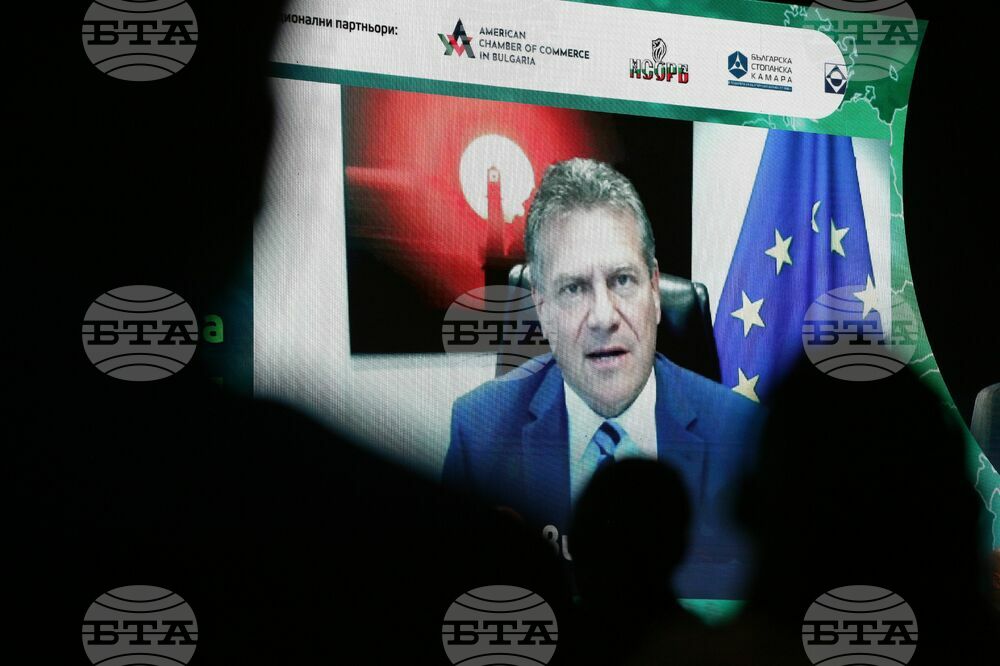In three years, Europe will need 800,000 highly qualified workers. This was said in a video interview by Maros Šefčovič, vice-president of the European Commission for inter-institutional relations during the “Green Week 2023” forum. The forum, which takes place in Sofia, is dedicated to the green transition in the countries of Central and Eastern Europe and energy connectivity, green financing and innovation. Organizers are dir.bg and 3E News, and BTA is a media partner. The questions in the interview were asked by Sergey Stanishev (Prime Minister of the Republic of Bulgaria (2005-2009), President of PES (2011-2022), Member of the European Parliament (since 2014).
The green transition is a big challenge, Sefcovic also said. These are new opportunities for a new beginning for the entire region. According to him, in recent years a new ecosystem with huge possibilities has been noticed. Each of them, if we apply it well, will create new jobs so that this industry will grow. People’s place in the green transition is in the creation of new jobs, he pointed out. Europe has a unique social model aimed at a high-value economy, and in this economy people with very high qualifications and skills are needed. In Europe, when we talk about the battery alliance, we estimate that in three years this industry will need 800,000 highly qualified workers, Sefcovic added. Thousands of new trained workers will be needed in every element of this new economy, he says, and for that reason education and vocational training will have to be adjusted.
In Europe we need to get down to the level of the clear and foreseeable problems that everyone faces, the issue is complex, he said in response to a question about people’s fears and their future. In his words, the economy in Europe failed to recover after the covid crisis, which was immediately affected by “Russia’s illegal invasion of Ukraine” with a dramatic impact on energy and prices, and its negative impact on industries.
When we ask people how they think about climate change, 90 percent of them see it as a serious problem. People understand that climate change, floods, air pollution are very harmful to the planet, to children and their health, he added. According to him, it is necessary to unite the messages about how important it is to deal with climate change, that we can protect people from major shocks of transitionbut, to tell them what we can do to help the regions in transition, how people who are 40-50 years old will be retrained, we need to explain what social protection is available. People should know that the transition will not pass anyone by, everyone will be affected, but social activities in Europe, traditionally, help people, he added. We have much more support compared to the US and China, but in order to keep the support, we need to show the citizens that they should not be afraid and know what awaits them, Sefcovic added. In the EU, we must join our efforts and show what the main projects are for a given region, he pointed out.
The European Battery Alliance, which Bulgaria joined in April this year, was something of an experiment for Europe, Sefcovic also said. The Energy Union project, for energy strategies, which I was responsible for, was very much in place and it helped to speed up the processes, thus Bulgaria was able to cope with a difficult period in terms of energy – difficult conditions with great challenges, he added .
Mobility in the future will be with electric cars and therefore technologies are needed, and the automotive industry in Europe must cope. The extraction of raw materials, the production of batteries, their recycling – 800 productions from different countries are included in this alliance, and this is how the chain for creating added value is built, he added. The capabilities in Europe are already there and the batteries have their own digital passport, and the carbon footprint will be included in these passports, which will give these products a competitive edge in Europe. That way we will be one breast ahead of our competitors, Sefcovic also said. Thanks to our cooperation on projects worth 60 billion euros, many new capacities were created in this industry and we managed to achieve a double goal – we set an example to others and coped with the tough competition, especially in the USA, where subsidization is unprecedented, Sefcovic pointed out . In his words, China’s competition is great because state funds are used for these productions.
In Bulgaria, you have three regions where special attention should be paid during this difficult transition – Stara Zagora, Kyustendil and Pernik, Shefcovich also pointed out. For the countries of Central and Eastern Europe, it is important to know how to best utilize the support that the EU can provide. There should be an “iron” system, and the minister should monitor how the plans are implemented, how much funds are provided and how much they are used, he added. The rule for this is that three years after the end of the program the projects must have been completed, and therefore it is important to monitor how they are implemented and how much European funds have not been used in the countries, he added.
The EU offers many ways to help countries, so it is possible to modernize countries and invest in people to prepare them. We must be ready to show that what is being spent is for the transformation of the economy and for the modernization of Europe, Sefcovic added.
